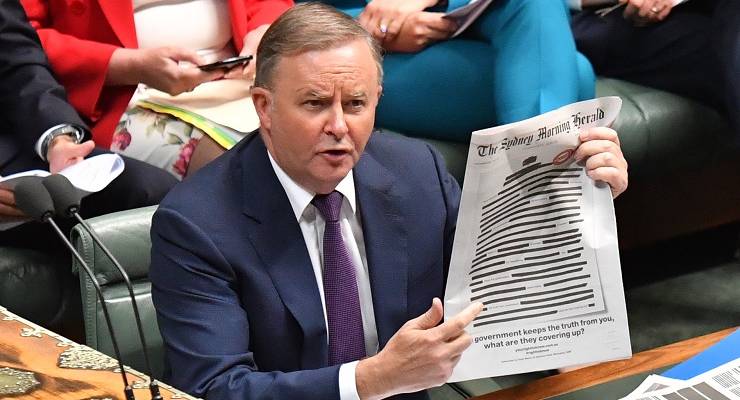
…where the CDPP independently considers that there is a public interest in a prosecution for one of the relevant offences involving a journalist, the consent of the attorney-general will also be required as a separate and additional safeguard … if such a request came before me, I would, as first law officer consider the evidence.
— Attorney-General Christian Porter, September 30, 2019
I do not believe that those decisions about who should be prosecuted at the end of the day should be made on the whim of politicians.
— Prime Minister Scott Morrison, October 22, 2019
What a confused Scott Morrison was ignoring, of course, is that there is no whim involved in the police state we’ve allowed to be constructed in Australia. Those who embarrass the powerful are punished; the powerful are not.
The perpetrators of the bugging of Timor-Leste’s cabinet remain unprosecuted; Witness K and Bernard Collaery continue to be harassed and dragged into court.
The very senior figure who leaked an ASIO report to serve the government’s partisan interests, and the journalist who acted as their stenographer, face no investigation; the journalist who revealed an attempt to extend spying against Australians still faces prosecution after being raided.
Apart from being completely confused, or perhaps just engaging in some Trumpesque denialism, Scott Morrison’s tactic for dealing with the mainstream media’s Right To Know campaign is to attack a straw man.
“Whether they’re politicians, whether they’re journalists, whether they’re anyone … there is no-one in this country who is above the law” — “above the law” being a phrase the prime minister has used repeatedly.
Except authorised leakers — politicians, their staff, and senior bureaucrats — are above the law. The goons of the AFP will, as Crikey has noted repeatedly, never investigate them, and if forced to investigate them, will find no wrongdoing.
Labor, however, is all for press freedom and transparency. Anthony Albanese, Tanya Plibersek, Mark Dreyfus and Kristina Keneally all tweeted their support yesterday, while Keneally used Senate estimates to ask questions of the AFP and Albanese asked Morrison about it in question time.
Dreyfus also went on that paragon of media freedom, Sky News, to explain that Labor supported the demands of media groups for better protections for journalists and whistleblowers.
To be fair, Dreyfus established the first protections for Commonwealth whistleblowers when Labor was in government; Labor also improved Freedom of Information laws under Kevin Rudd (and got zero credit from the media).
But Dreyfus also signed off on Witness K and Collaery being bugged and surveilled, and he, like all his Labor colleagues, has remained completely silent about the greatest national security scandal of recent decades.
The government’s harassment and persecution of those two patriots, you’ll recall, involves some selective harassment of ABC (but not News Corp) journalists, editors and producers, and a seeming attempt by Porter to prevent any media reporting of the trials. Labor’s newfound commitment to press freedom doesn’t extend to that, let alone the principals of the matter.
It seems Labor would also prefer people forget its complicity in the attacks on press freedom, and basic civil rights, in recent years.
It backed the establishment of Australia’s first mass surveillance scheme in the Abbott government’s data retention laws, which are crucial to enabling the AFP to hunt down whistleblowers and sources for journalists
It backed extensions of so-called “insider threat” laws designed to better gag intelligence officials who might reveal misconduct or crime within intelligence services
It supported laws that would jail anyone who revealed intelligence operations.
It even voted, despite pointing out what a disaster they were, for the government’s laws designed to force backdoors into encrypted communication systems — exactly the kind of systems crucial to enabling whistleblowers, journalists, lawyers, law-abiding activists and anyone else who has a legitimate need for confidentiality to communicate without worrying about the government surveilling them.
Labor’s role in enabling the establishment of a police state in Australia of course reflects its calculation — quite correct — that there is no political benefit in standing up for press freedom in national security debates. Indeed, when the party has done so, the government’s handmaidens at News Corp — currently masquerading as an advocate of freedom — have savaged the party.
There’s plenty of hypocrisy to go round in all this. But unless Labor intends to revise its joined-at-the-hip approach to extending national security laws, maybe it should keep the embarrassing #righttoknow tweets to a minimum.








Crikey is committed to hosting lively discussions. Help us keep the conversation useful, interesting and welcoming. We aim to publish comments quickly in the interest of promoting robust conversation, but we’re a small team and we deploy filters to protect against legal risk. Occasionally your comment may be held up while we review, but we’re working as fast as we can to keep the conversation rolling.
The Crikey comment section is members-only content. Please subscribe to leave a comment.
The Crikey comment section is members-only content. Please login to leave a comment.